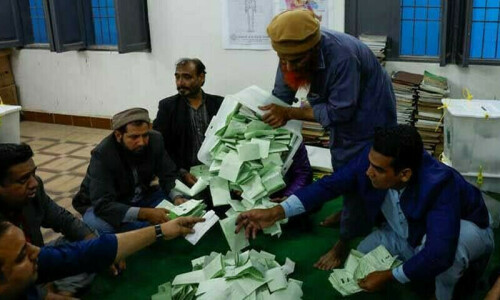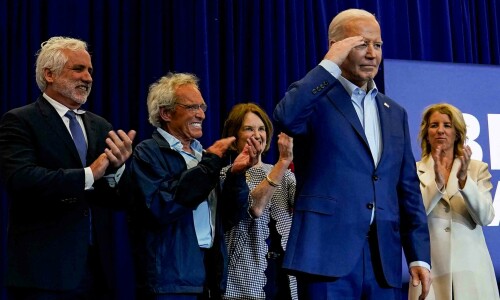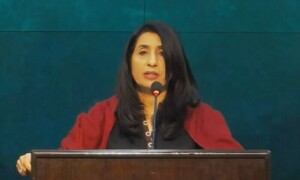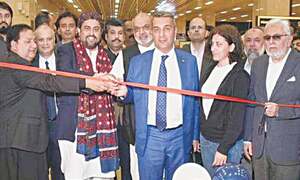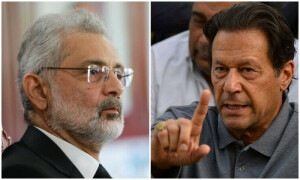FOR long, many have talked of successful political reconciliation in Afghanistan as the last hope to prevent prolonged instability in the country post-2014.
One significant part of the reconciliation process is the effort to bring the Afghan Taliban ‘in’ — ideally into the current political system. The recent announcement and acknowledgement of formal talks between the US and Qatar-based Taliban interlocutors was therefore rightly welcomed.
The hype didn’t last, however; it ended as abruptly as it was created. Even before the talks have taken off in earnest, pundits are busy telling us that they are dead in the water.
Surely, the process has gotten off to an undesirable start. All key actors have already threatened to pull out. The Taliban don’t want to recognise the Afghan government but President Hamid Karzai won’t put his weight behind the effort without that recognition. The US can’t ignore domestic political realities and begin releasing prisoners without putting a transparent process in place. The Taliban are dogmatic about their brand of Sharia and to a large extent, about eviction of the foreign presence from Afghanistan.
The list of these seemingly irreconcilable differences could go on. But playing these up beyond a point is neither here nor there. What has ensued since the announcement of formal talks is hardly surprising — surprising it would have been had everything gone smoothly.
You could have asked anyone in the business of analysing the Afghan conundrum at any point over the past year and discovered that the process was going to be tedious; that it would be a long shot; and that more than likely talks would not work.
Why? Precisely because the kind of meltdowns we have witnessed over the past fortnight were entirely expected. So pointing to the fact that things are going terribly is stating the obvious. Apart from running the process to the ground prematurely, it serves no purpose.
Policymakers need ways to break through these initial barriers. The process is already starting too late and there are few concrete answers to these questions still. What would it take from this point on to make this work?
While each of the key players will have to remain flexible and make decisions antithetical to their reflexive stances, let me focus specifically on what Pakistan can do to help.
First, Pakistan must remain involved and the world must continue demanding its help. For the record, I have been a longtime critic of Pakistan’s traditional overreach in Afghan affairs. But that and the current situation are very different. It is difficult to fathom what good it would do for the country with the most clout over the Afghan Taliban and physical access to some key Taliban leaders to sit back and let the process wither. More than ever, Pakistan needs to play a proactive role — a constructive one with the singular objective of nudging the Taliban to negotiate sincerely.
Simultaneously, pressure needs to be put on the Taliban to revise violence levels in Afghanistan downward. It may seem outlandish but a win-win arrangement could be found if Pakistan (and others with influence) pushes the Taliban to cease attacks on Afghan and international presence while peace talks progress. As a quid pro quo, the international and Afghan forces would reciprocate with a localised ceasefire. Tools such as drone strikes or other counterterrorism measures would then only be used against Taliban factions who breach the commitment.
Not to gloss over Pakistan’s fairly dicey relationship with Mullah Omar and company, the security establishment has some potent sticks in hand. The modest number of Taliban prisoners still in custody is an obvious one. The families of these and other Taliban is another card that has usually come in handy in crunch time in the past. And then there is always the threat of Pakistan tightening the screws on Taliban presence or on their activities from Pakistani soil. Used prudently and selectively, these could have some impact.
I see no realistic possibility of the Pakistani security establishment choosing to turn actively against the Taliban — both for fear of reprisals and because they envision the Taliban having considerable hold over the Afghan areas bordering Pakistan post-2014. But just what message the Pakistani military-intelligence combine sends to the Taliban matters.
Retaining ties and using them positively is one thing; but any hint that Pakistan will be willing to back the Taliban if things go wrong in Afghanistan after the exit of the International Security Assistance Force is quite another. It would embolden the insurgents and remove any compulsion for them to reconcile with the US, Kabul or other Afghan opponents. Afghanistan’s descent into the abyss may then become a self-fulfilling prophecy. As far as one can tell, Pakistan has avoided crossing this fine line thus far. It must continue to do so.
Finally, if the number one goal is to see the reconciliation talks proceed — it should be as Pakistan, like each of the other actors involved, stands to lose immensely if they don’t — all other irritants have to be tuned out.
Perhaps the most worrying is the Islamabad-Kabul relationship. It is difficult to exaggerate how deeply resentful the Pakistani diplomatic and military circles are of President Karzai’s constant finger-pointing at Pakistan. Their reasons notwithstanding, putting him down at the cost of affecting the talks is hardly sensible.
Islamabad may have faltered on this count already. If it had used its leverage prudently, it could have possibly nudged the Taliban to avoid irking Karzai by hoisting their flag in Qatar — they have almost been pretending to be the government in waiting. As far as I can tell, there wasn’t much of an effort from anyone to hold the Taliban back. Such situations will keep arising; it won’t hurt for Pakistan to remain prepared to use its influence positively when they do.
The writer is South Asia adviser at the US Institute of Peace, Washington, D.C.

















